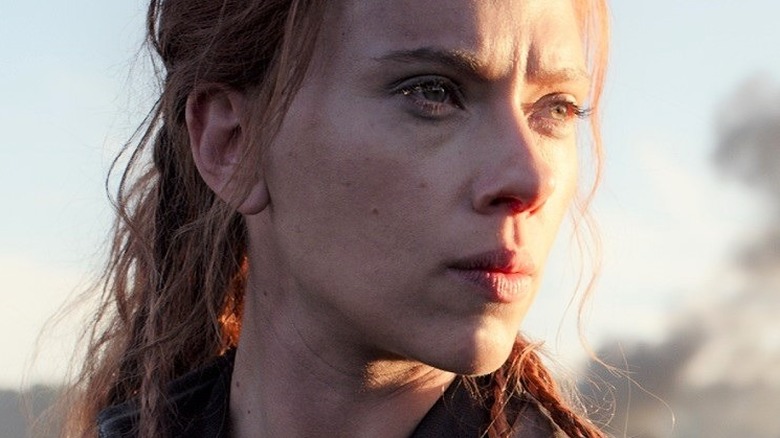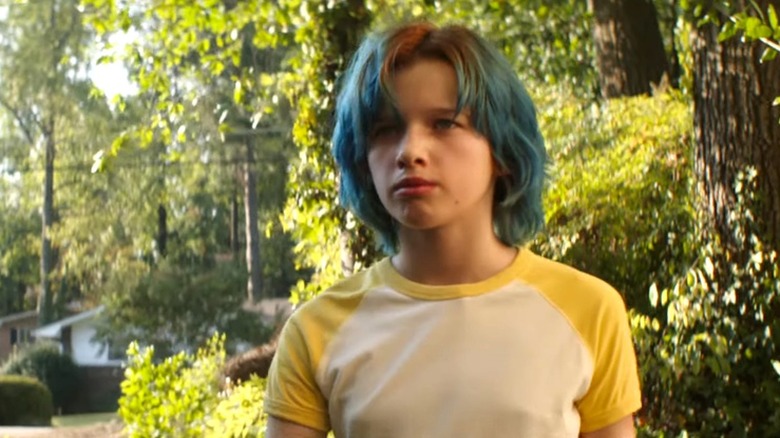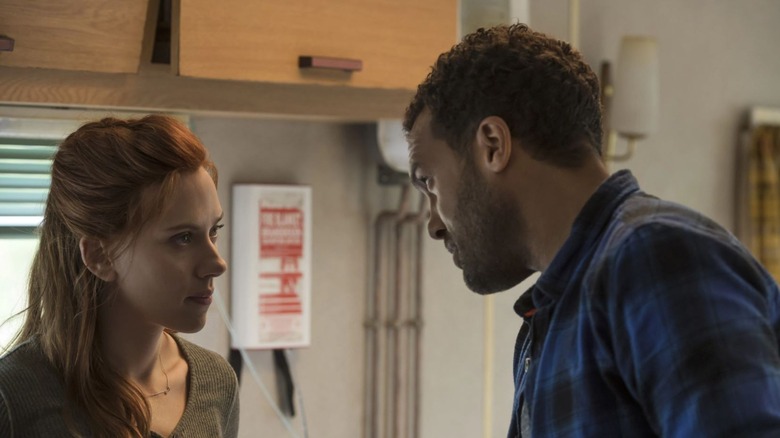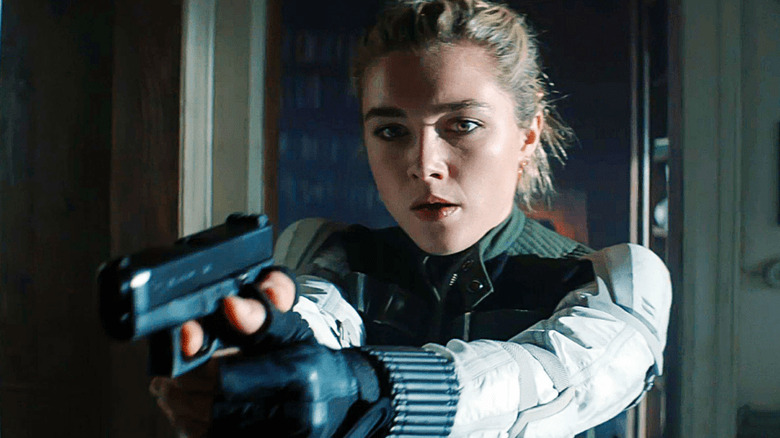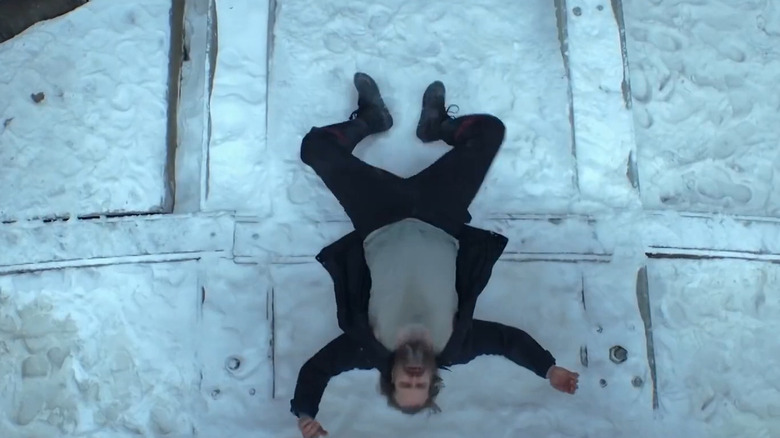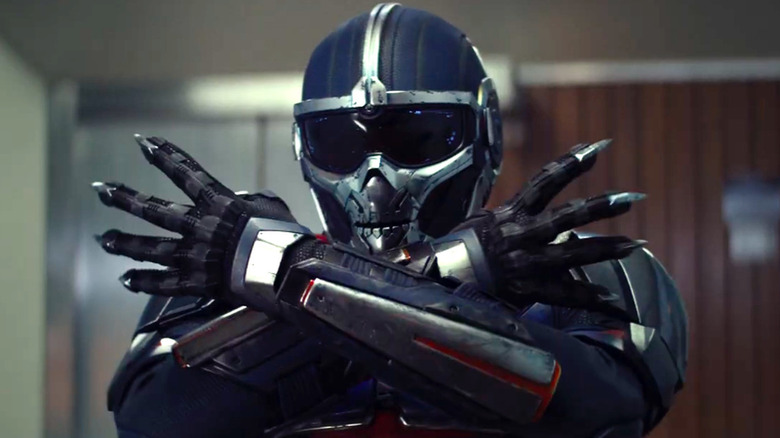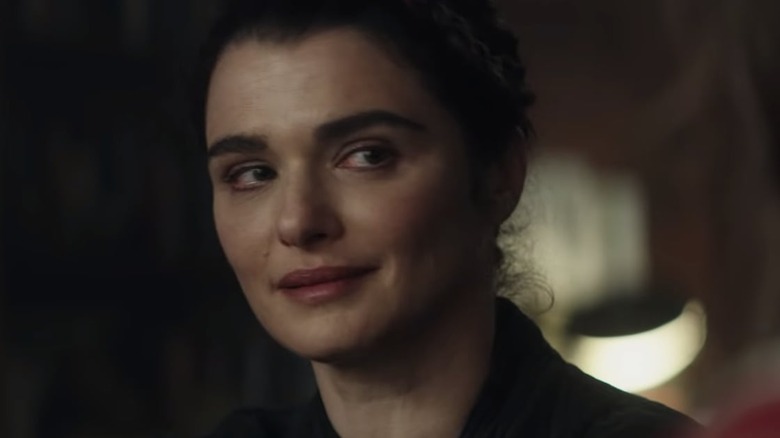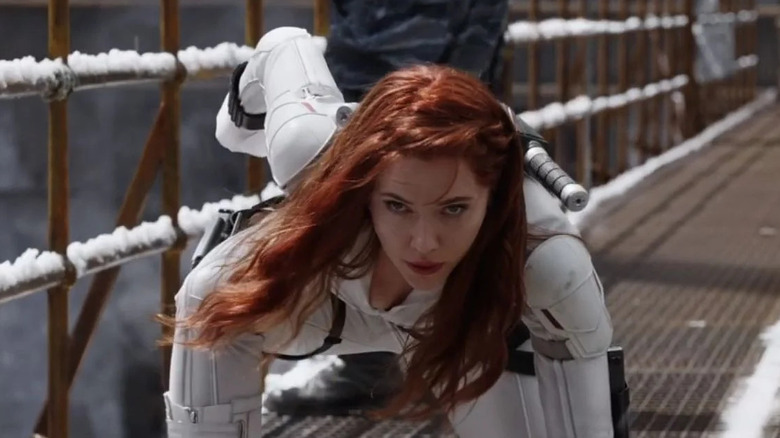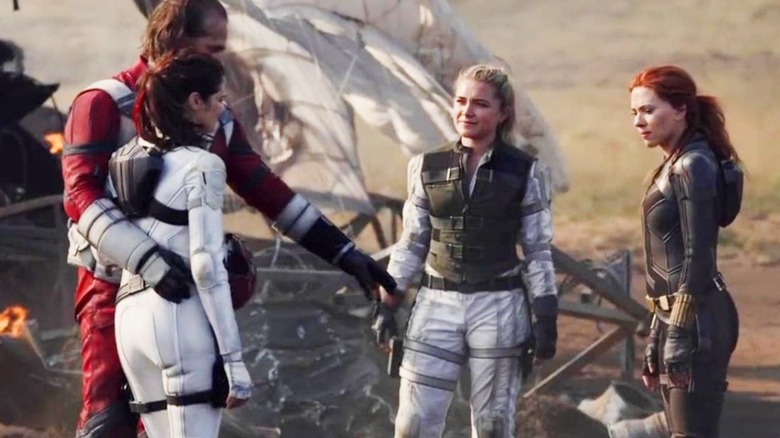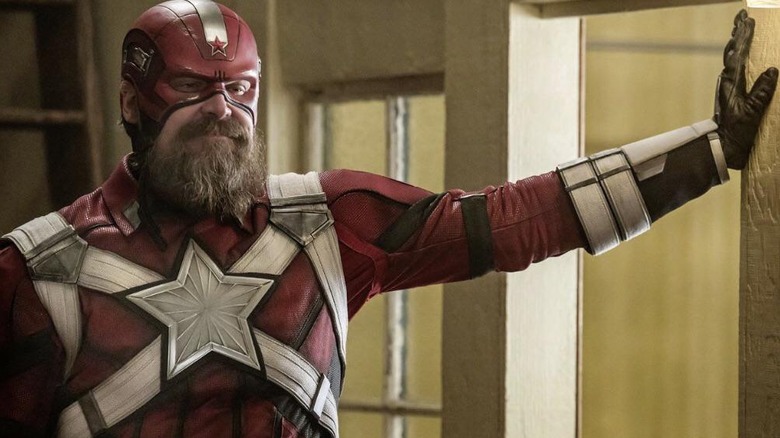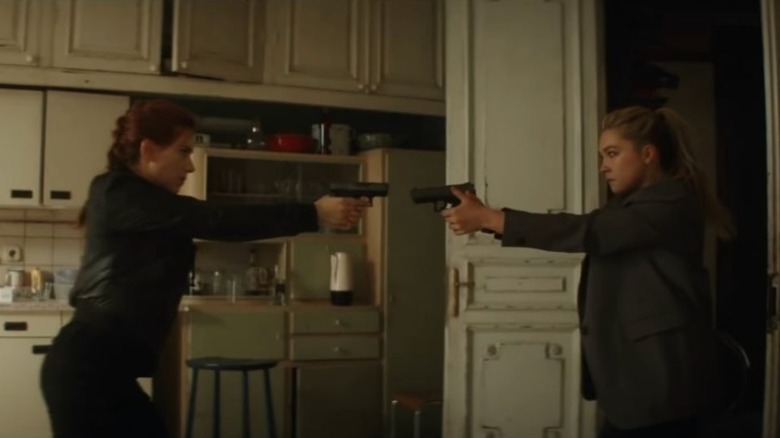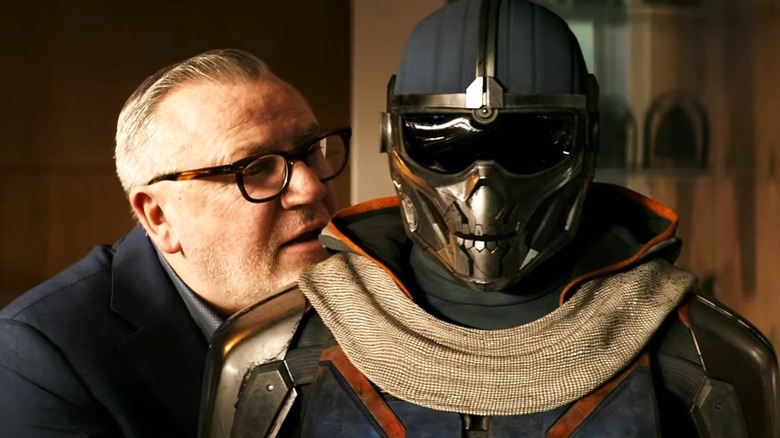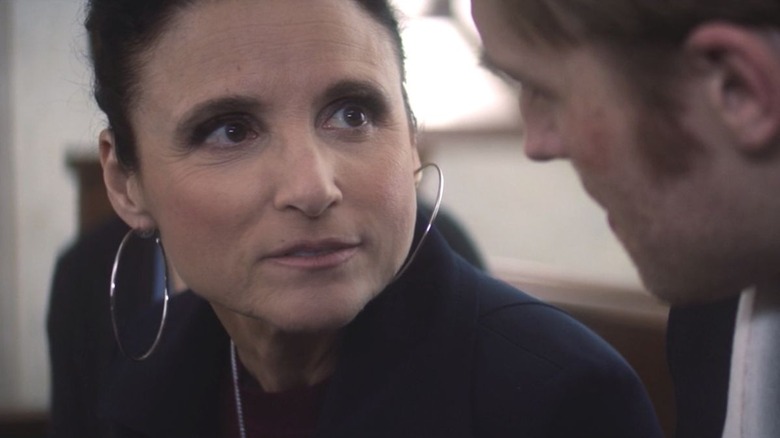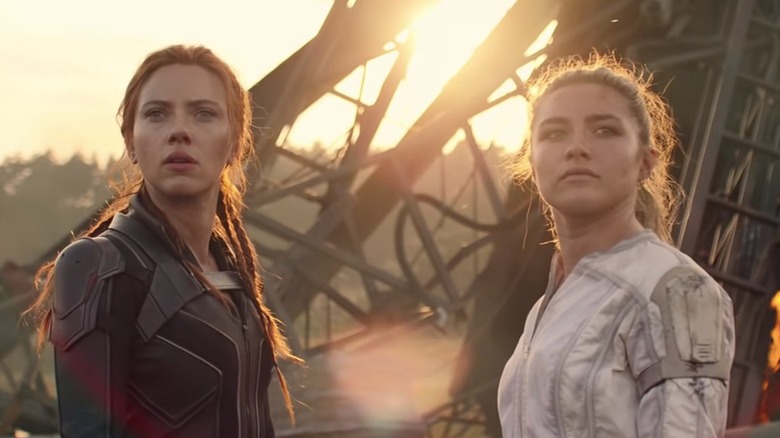Best And Worst Things About Black Widow
After multiple postponements, "Black Widow" is finally here! Giving Natasha Romanoff the solo film that's long overdue (but nonetheless welcome), the film sets up a future MCU star with Yelena Belova, introduces some other characters that may have a future, and works to fill some much needed gaps in the corners and crevices of Natasha's story.
The film boasts several excellent performances, a lot of smart dialogue, some incredible action set pieces, and an interesting spy backstory wrapped in MCU lore. It's a fun film, but like all movies, it has its strengths and weaknesses. So which parts of "Black Widow" will blow you away, and which ones will leave you feeling less than impressed? Well, whether you need to wipe that red from your ledger or you're just curious about the 24th feature in the Marvel Cinematic Universe, read on for our spoiler-filled discussion of the best and worst things about "Black Widow."
Best: Black Widow has the perfect needle drop
For a time, Yelena Belova and Natasha Romanoff were raised in the United States by Alexei Shostakov (aka the "Red Guardian") and Melina Vostokoff, the latter pair pretending to be good American parents while secretly working for Russia. The film's introduction sees the group suddenly pack and flee following the completion of a mission and the inevitability of U.S. capture. During the drive to their escape plane, there's a needle drop of Don McLean's "American Pie," and it's absolutely perfect.
This moment is the one that seals the young girls' fates. They'd been living undercover as two ordinary American kids in an American family, and now, they're going back to Russia. What waits for them there? The infamous Red Room and a long stint of torture, training, and mind control instead of a childhood. And that makes the lyric "bye-bye Miss American Pie" perfect because it reflects the collapse of the girls' happy lives and imagined futures as "normal American girls." Additionally, the song's iconic "this will be the day that I die" is sadly poignant as this is the moment where the part of the girls — the pre-trauma, hopeful child part — does indeed die. It's sad, but the song encapsulates it perfectly.
Worst: Mason is who exactly?
Now, this is a character who has a slightly larger role in the comics than in the MCU, but "Black Widow" suddenly introduces Mason to us out of seemingly nowhere. (Did you know his name? Exactly.) He's presumably Black Widow's guy for all sorts of needs when she's off the Avengers payroll and on the lam. The film also implies that he's a private contractor and indicates some sexual tension during his few scenes in the film.
Actor O.T. Fagbenle does an admirable job in what's a simple role, but here's the thing ... the dialogue is intended to suggest a romantically infused (if unmet) and complicated relationship, but it just underscores the fact that we've never seen this character until now. At no point has this guy been in an MCU film before, so pretending that there's a relevant backstory in a "Black Widow" film shot after the titular character's death and the MCU has moved on just underscores how little the film was planned for, unlike the rest of the MCU's elaborate intricate plans.
Best: All things Florence Pugh
Natasha Romanoff is an iconic, central MCU character who was certainly underscored by Scarlett Johansson's considerable talent and charisma. Those are big shoes to fill, and in setting up Natasha's replacement, Marvel had to cast an actress who could bring something new while meeting the de facto requirements of being a believable badass. Enter Florence Pugh's Yelena Belova, equally skilled as Romanoff but with less "red on my ledger" feelings of moral debt and more comedic irony.
She isn't a "better character" than Johansson's continually excellent Romanoff — she's a relevantly different character with different traits, similar aptitudes, and a ton of talent behind it all. Without trying to replace or replicate Johansson's legacy, Pugh adeptly carves out her own distinct one, and frankly, we need more of it. She's charming and irreverent, skilled and ruthless, and she doesn't have baggage over her assassin history because she knows it wasn't under her control. The bottom line is that every scene she's in is a blast because Pugh's a ton of fun, and she has an unsurprisingly large amount of charisma to bring to the role.
Worst: Uh ... what about those Russian prisoners?
When the "Sisters Widow" reunite and break their adoptive "father," Alexei Shostakov, out of a Russian prison, the explosive chaos causes an avalanche that buries the prison in snow. Now, what we know about Red Guardian is that he was an extremely loyal servant who completed his Ohio assignment and, by his account, was promptly imprisoned once home. He's unsure why. But his loyalty was absolute, and he was successful, so being imprisoned most likely was an effort to "bury" him and silence his legacy in what was done with the information he stole (which fueled the advances in the Black Widow program).
In other words, he was most likely imprisoned for political reasons, so that's a facility where political prisoners go ... possibly pro-democracy demonstrators or perhaps insiders who rejected the Black Widow program or similarly terrible experiments. That's a prison full of folks who are meant to be silenced forever. When Alexei's escape triggers a massive avalanche and buries the prison, he's understandably thrilled, but that avalanche buries all those prisoners — good, bad, or otherwise. They're all likely dead now, and he's glad for it, but political prisoners don't deserve a snowy execution where the "heroes" don't seem to care, so the scene has terrible implications.
Best: Taskmaster is a great character
Of the film's villains, the most anticipated baddie is the fan-favorite Taskmaster. In the comics, Taskmaster is a criminal's criminal, with the agility to simply observe heroes and mimic their fighting styles with full accuracy and little training. While Taskmaster doesn't have super powers per se, the villain can impressively replicate a hero's fighting style and "moves" better than the heroes do themselves. And the character goes on to train numerous other baddies and henchmen in the Marvel universe.
However, things are a bit different in the film, as Taskmaster is revealed to be the maimed daughter of the villainous Dreykov ... and just as much of a victim as Natasha and Yelena. Her backstory adds a level of tragedy and gravitas to it all, while the fight choreography (mimicking Captain America's shield combat, Hawkeye's archery, Natasha's fighting style, etc.) is all exceptional and visually exciting. And her story shines new light on Black Widow's past as an assassin and goes a long way in explaining the guilt our hero has felt over the course of the MCU timeline.
Worst: Pig torture
When Natasha's "family" reunites, Melina introduces what appears to be a "pet pig" (also named Alexei). He's well-trained, smart, and adorable. To establish and demonstrate the extent of successful mind control, Melina takes out a tablet with the pig's attributes and vitals and dials its biological breathing down to zero. In other words, she's forcing the pig's body to physically choke itself, and she tortures it against the family's protests for a long, long time — almost to the pig's death.
Yes, it's a persuasive demonstration of the terrors and extent of the Red Room's mind control abilities. It also establishes the culpability and potential villainy of Melina, who's pivotal to the program. At the same time, she implies she's done those exact tests on pigs before. So basically, the film suggests a lifetime of torture for a poor creature, demonstrates its near-death experience, and doesn't address it again. It's needless cruelty because the rest of the story cements the evil of the mind control, so all we get out of that implied animal cruelty is a little unnecessary exposition. What gives?
Best: Natasha is a 'poser'
Despite the overall positive reception of Natasha Romanoff, one particularly odd aspect of her otherwise excellent fighting style was her commitment to a combat "pose," especially on landing — legs posed, arm out, face up ... you know what we're talking about. It's something her character routinely did mid-combat, and while she was awesome in every villainous altercation, the landing pose often looked a little ... forced. It's a fighting style seemingly designed for movie posters, not for combat.
As a consequence, it was pretty hilarious and refreshing when Yelena continually asked Natasha what, exactly, was up with her repeated poses. Yelena charmingly called her a 'poser,' and in this case, it was precisely true! This interrogation was humorous and swift, and Yelena continued to criticize Natasha's pose and methods in the way that only sisters do. It's also an interesting but complex introduction to Yelena — we can expect that she'll be her own person and that the era of the "Widow pose" is potentially over.
Worst: The unbelievable 'hero turn' for the parents
When the fake "family" reunites, Natasha and Yelena hear Melina's seemingly proud expression of having stolen the research to "unlock free will." It's a scary and dangerous admission — one that holds an almost apocalyptic level of potential. On top of that, she expresses pride over how tough the girls were and shows no apparent regrets about sending them to a lifetime of torture and mind control (a program Melina was pivotal in). Melina is a dedicated soldier of "the cause" (Alexei notes that she was Dreykov's architect of the chemical subjugation program), and her support of it runs deep. Even Alexei himself is proud of the girls and how many people they've killed over the years.
But as the film goes along, the parents suddenly betray the organization they've been giving their entire lives to and sacrificed children to. It happens a bit quickly, especially since Alexei is deluded and seems to think his duty to Russia makes up for handing Natasha and Yelena over to the Red Room, and Melina explicitly defends her treacherous parenting by noting, "We had our orders, and we played our parts to perfection." Even if it was a rationalization, she'd spent a lifetime doing terrible things on behalf of the Red Room. So, their sudden hero turn (especially for Melina) is pretty sudden and unbelievable.
Best: Red Guardian is a charmer
One of the big standouts in "Black Widow" is David Harbour as Alexei Shostakov, the Red Guardian. Red Guardian was a Russian super soldier (basically their equivalent of Captain America) who had a red, Soviet-style costume and reflected Soviet values in the same way Steve Rogers (and now Sam Wilson) reflected ideal U.S. values. For his efforts, Red Guardian was imprisoned, creating an interesting break from ideology that takes the character in fun directions.
The best thing about Red Guardian, however, is that the just-out-of-prison character is both complicated and charming. Despite his strength and long history of heroics (well, as he sees them, anyway), Alexei is often played for comic relief as a man who's a little out of touch, a little dorky, and who truly thought of Yelena and Natasha as his family despite giving them to the Red Room. While Alexei's choices were less than commendable, Harbour's complex and charming performance is a welcome element in every scene he's in, and both his jealousy over Captain America's fame and that ferocious "dad energy" are a riot. We're hoping he'll hopefully find some way to return to the MCU.
Worst: Unbelievable forgiveness
One of the worst things about "Black Widow" is the abrupt "hero turn" for the parents, which makes little sense in the context of the film. The weirdest part of it all is that, despite her pain, Yelena accepts Melina as her real mother while Natasha trusts her enough to participate in a dangerous ruse towards the end of the film. The problem is that neither actually had enough reason to trust her (or Alexei). Both parents seemed fine to betray their adopted children into a lifetime of torturous servitude, and at this point, they haven't expressed regret. Instead, they give the impression that they were dedicated to the cause and did what had to be done.
Suddenly caring about, say, torturing children is a strong about-face for them, so for savvy characters like Natasha and Yelena, they have no real basis to believe them. Frankly, it isn't comprehensible given how Melina was fine with the chemical subjugation, and even performing actions that are good for the heroes in this instance shouldn't bring the parents unearned forgiveness. It's also difficult to pin down why the hero turn occurred. For example, learning about the indoctrination of Yelena shouldn't have changed Melina's mind given she certainly knew about that as its chief architect and has already called the Red Room before they arrive at her home. Any redemption should've been grossly challenged but was absolutely unacknowledged.
Best: Black Widow's action scenes
The MCU has given us some extraordinary action scenes, complete with impressive stunts and incredible fight choreography. And that's especially true for "Black Widow," a film with fight scenes that feel (for the most part) more grounded in the real world than, say, "Doctor Strange" or "Guardians of the Galaxy." Black Widow and her sister escaping via motorcycle from assassins? Stellar. Natasha versus a small army of Widows? Great.
The film may not have the unbelievable oddities of "Thor: Ragnarok" and the like, but it doesn't disappoint in the combat and stunt department. Even the first fight between Yelena and Natasha sees the two having a truly fierce, Jason Bourne-style battle, showing they're both deadly and equally matched. It's a great way to quickly establish what to expect from Yelena, and it's part of the narrative that's told with action rather than words — a great strength of the film throughout.
Worst: The no-consequence main antagonist
While Taskmaster is a great secondary antagonist and physical challenge, the real string-puller is the mysterious Dreykov. He's responsible for the chemical subjugation of the Widows and behind a nefarious master plan. Much of the film is spent with the sisters looking for Dreykov and for the location of the torturous Red Room that so destroyed so many childhoods. It's certainly fine to have a mysterious puppet master that the protagonists have to uncover, but unfortunately, he shows up in the film so late and appears so relatively little that he isn't as impactful as he could be. When the mysterious Dreykov is finally on screen he's ... fine. And most of his scenes take place in what looks like a high-tech meeting room. Ultimately, he's not that memorable as an antagonist.
It would be better if the character's nefarious plot had been a presence before this (he was mentioned in "The Avengers," but the world-manipulating plan wasn't) or if we knew there would be greater consequences for the character and his evil machinations. But the unfortunate thing about a prequel like "Black Widow" is that we're pretty sure what happens with Dreykov and his plans in the future of the MCU ... they don't change the world the way he intends. At the end of the day, the big villain just isn't that memorable, and we know his plans aren't the threat he describes them to be, a fact that really takes the teeth out of his role.
Best: The post-credits teaser
At the end of "Black Widow," the heroes go their respective ways, and in the post-credits sequence, the film picks up back in the proper Marvel timeline. After all, the bulk of the movie takes place before "Infinity War," but after the credits roll, we see a post-"Endgame" Yelena visiting Black Widow's grave. And it's here that she's approached by a mysterious character — the Contessa Valentina Allegra de la Fontaine, who first appeared in "The Falcon and the Winter Soldier." Val has a job for Yelena ... one that involves hunting down Hawkeye.
Not only does the post-credits scene feature a fun MCU cameo, it's also a great way to introduce Yelena to the wider MCU world. Plus, it efficiently establishes her as coming into contact with the Avengers — something that needs to happen given the film is setting up Yelena's role as the next Black Widow. And, of course, by setting up her eventual showdown with Clint Barton, the post-credit scene is teasing a true conflict for our MCU heroes, one that will be even trickier to navigate without Natasha, Steve Rogers, and Tony Stark around. In other words, this is one of the MCU's very best post-credit moments.
Worst: Black Widow has some pacing issues
While "Black Widow" has a lot of interesting fight scenes and engaging chase sequences, the pacing of the overall story is a little strange. Natasha and Yelena want to stop Dreykov and his Red Room so they reunite with their former parents because they don't know where either of those things are. But so much time is spent establishing all these elements that the actual plot doesn't really start until about 40 minutes into the film. That isn't to say there's a shortage of action, but it feels odd upon reflection. Of course, once the movie actually takes off, it's a pretty swift and engaging journey, but it takes a while to get there.
Another consequence of the first leg of the story being Natasha's pursuit of information (combined with Yelena's introduction) is that through these moments, Natasha is a fairly reactive character. So much of this stretch of the runtime amounts to Natasha meeting someone, them leading her to the next step, and repeat. As a result, it feels like our protagonist is passive in her own solo outing. It's certainly fine to spend time introducing us to new characters and have a character's pursuit of information be the first part of their journey, but the filmmakers could've structured that journey a bit better and showcased Natasha more pointedly.
